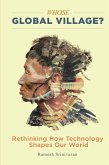Through the frame of Zoom, this collection of essays examines the rapid emergence of videoconferencing in everyday life under COVID-19, its preexisting performative logic, and the ongoing implication of these practices for millions of individuals and institutions.
The year 2023 marked the end of the World Health Organization's classification of the COVID-19 outbreak as a "public health emergency of international concern," yet many of the organizational and institutional restructurings that occurred in the rapid response to the pandemic have remained firmly in place. The prevalence of videoconferencing in everyday life marks one such instance, not only highlighting the dramatic social and cultural transformations that occurred during a period of lockdowns, social distancing, and stay-at-home orders, but also serving as an index of all that has emerged as the "new normal" since March 2020.
Overnight, it seemed, Zoom emerged as the default videoconferencing platform, rapidly morphing from brand name to eponymous generic. While this volume focuses predominantly on Zoom and its place in the collective imagination and daily practice of those of us whose lives are profoundly caught up in digital networks, many of these insights presented here apply to other videoconferencing platforms as well, and a supporting logic that has governed neoliberal lives since long before the first lockdowns began. The twelve chapters in this collection explore how videoconferencing platforms in general, and Zoom in particular, have provided individuals and institutions new modes of "engagement," while at the same time reifying, normalizing, and domesticating modes of surveillance, control, and marginalization that have been part and parcel of a networked-based performative logic for nearly a century.
The year 2023 marked the end of the World Health Organization's classification of the COVID-19 outbreak as a "public health emergency of international concern," yet many of the organizational and institutional restructurings that occurred in the rapid response to the pandemic have remained firmly in place. The prevalence of videoconferencing in everyday life marks one such instance, not only highlighting the dramatic social and cultural transformations that occurred during a period of lockdowns, social distancing, and stay-at-home orders, but also serving as an index of all that has emerged as the "new normal" since March 2020.
Overnight, it seemed, Zoom emerged as the default videoconferencing platform, rapidly morphing from brand name to eponymous generic. While this volume focuses predominantly on Zoom and its place in the collective imagination and daily practice of those of us whose lives are profoundly caught up in digital networks, many of these insights presented here apply to other videoconferencing platforms as well, and a supporting logic that has governed neoliberal lives since long before the first lockdowns began. The twelve chapters in this collection explore how videoconferencing platforms in general, and Zoom in particular, have provided individuals and institutions new modes of "engagement," while at the same time reifying, normalizing, and domesticating modes of surveillance, control, and marginalization that have been part and parcel of a networked-based performative logic for nearly a century.









